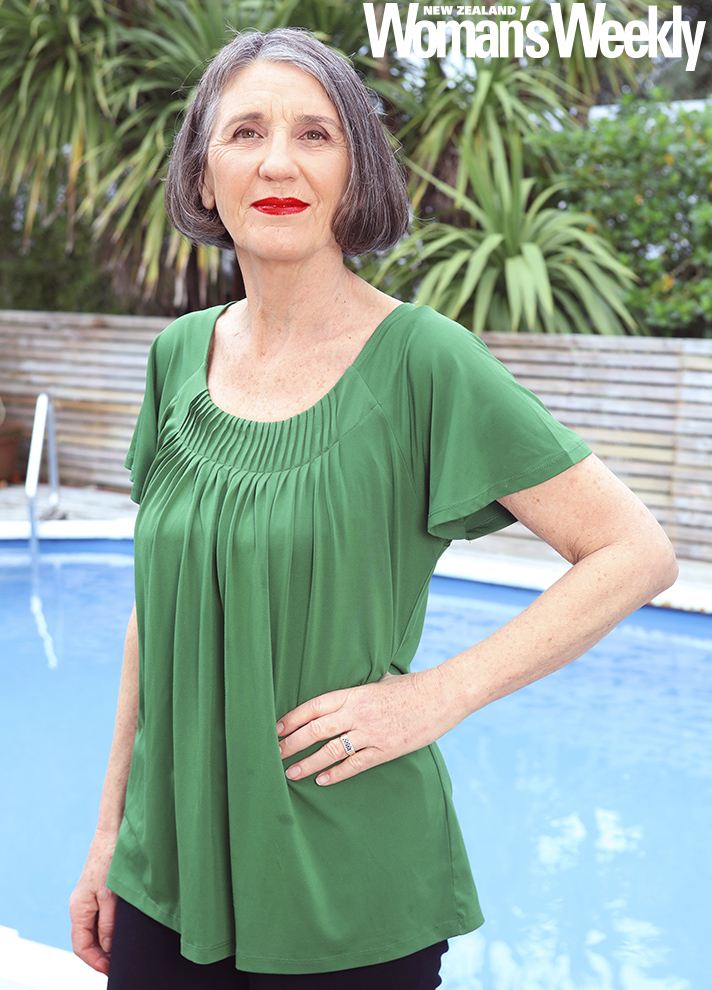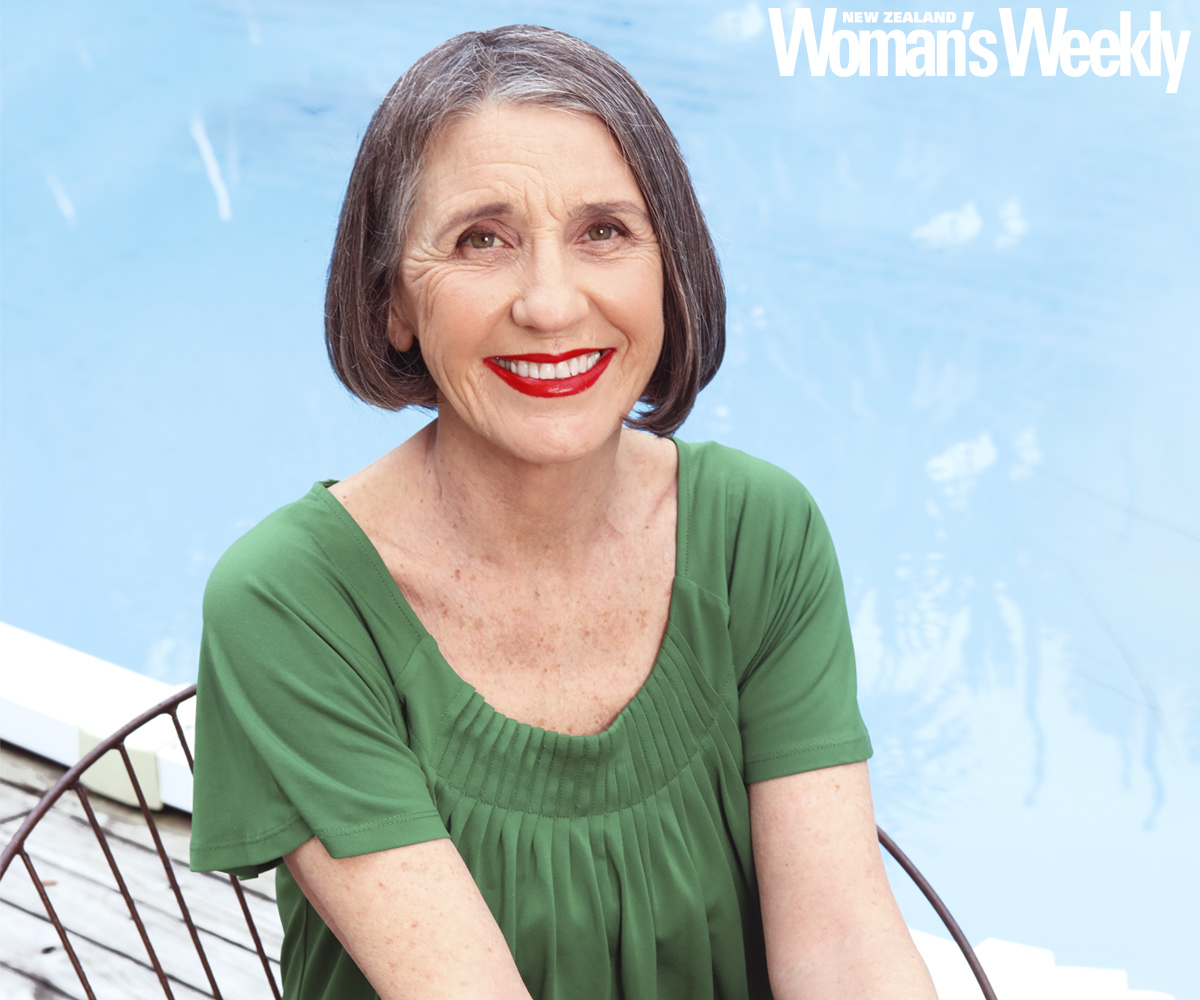When writer Kirsten Warner went for a bike ride to clear a niggling headache, she could never imagine a cruel twist of fate would see her miss two major milestones and steal months from her life.
What should have been a glorious year of literary success for the 62-year-old west Aucklander turned to chaos in March when she was struck by a catastrophic brain aneurysm.
Still recovering from the nightmare ordeal, the former journalist and mum of two knows she is lucky to be alive but is sad that a prestigious book award win and an accolade for her musician partner both came in a scary eight-week period when she was out cold undergoing a series of life-saving operations.

There’s a large gap in her memory that she’s reliant on family and friends to fill – including a night that should have been one of the best of her life.
“I had no idea what was going on, really, and how long it had been. I couldn’t believe that I had been in hospital for six weeks,” she tells the Weekly.
On that fateful March day, the keen cyclist had headed out on her bike to clear her head of a persistent ache. But after an hour of riding it was getting worse.
Thinking she was in the throes of a violent migraine, she called her partner Bernard Griffen (68) to take her home. Within minutes, her condition dramatically deteriorated.
“I was completely struck,” she recalls. “I couldn’t bear the light, and the headache was getting worse. I thought it was a migraine, but by the time I got into my bedroom the pain in my head was so intense I said to my partner, ‘ambulance’. I couldn’t say any more.”
The last thing Kirsten recalls is two paramedics standing in her home.
“That’s all I remember. From then on, it’s what I’ve been told happened.”
Her life in the balance, Kirsten was rushed to Auckland City Hospital, where she had an operation to stem a potentially deadly bleed on her brain.
“They clipped the aneurysm and then over the next month struggled to stabilise the fluids in my brain and did four different procedures.”
This included putting a drain through her left eyebrow and a shunt at the back of her head connected to a tube that ran down into her abdomen.
Meanwhile, those closest to her prepared for the worst.
“My family were very upset. They thought I wouldn’t make it. My partner was there every day. I feel like he has shown me this incredible devotion that is so unconditional and constant that I’m absolutely smitten by it.
“My son Joseph was there the first few weeks. He took over my phone, talking to people and doctors. My daughter Marcella was upset but visiting all the time.
“I just feel so blessed. And then there’s been this incredible outpouring of affection from friends. I had no idea how many people I knew cared about me.”

With musician partner Bernard.
As she recuperates in her Te Atatu home, a framed certificate sits in pride of place on a shelf in her lounge, presented to Bernard in her absence.
Kirsten had no idea her debut work, The Sound of Breaking Glass, had been earmarked for the prestigious Hubert Church Prize for best first book of fiction in the Ockham New Zealand Book Awards.
“[I knew] there was a chance but that was all,” she says. “They hadn’t told me.”
Below the accolade sits the Taite Music Prize’s Independent Spirit Award that Bernard received in April for his services to New Zealand music.
“I didn’t know that he’d got his prize either,” Kirsten says.
“It’s terrible. You have these two wonderful events in our lives, you spend so much of your life working in the dark and then you go, ‘What was that about? I’m not there for my partner’s amazing award.'”
Equally disappointing was missing an event she had always longed to be part of – the Auckland Writers Festival.
“I was a guest for two events and couldn’t take part in either of them. So you think, ‘Oh well, there’s a different plan, there must be a reason for it.'”

After such a turbulent year, Kirsten is relishing her second chance at life.
She says it was gratifying to get acknowledgement from the writing community, given the hard yards behind getting her second-generation Holocaust survivor novel published.
“It was a really long process because I’d worked on it on and off for about 10 years and it took another eight years to get it published. It was a very long, difficult process and I didn’t have an easy time. I found it very hard to continue to believe that I was a writer so it was very good to get that award.”
She has a second book underway – “it’s about a third of the way through and again it will be fraught with difficulties” – and has resumed teaching music with Bernard at a drug rehabilitation centre.
After such a turbulent year, she says she is relishing her second chance at life.
“It’s like starting again. I’m really fit, and I think that’s probably helped me, but I think there’s no rhyme or reason for who survives and who doesn’t.”


.jpg)

